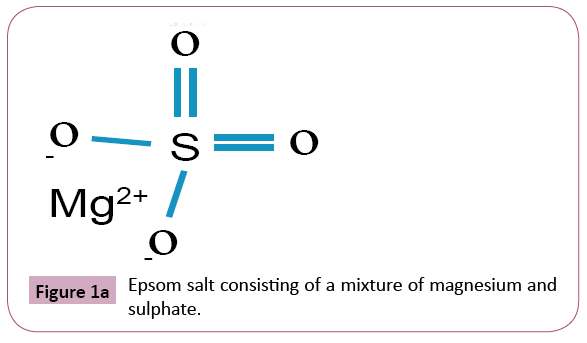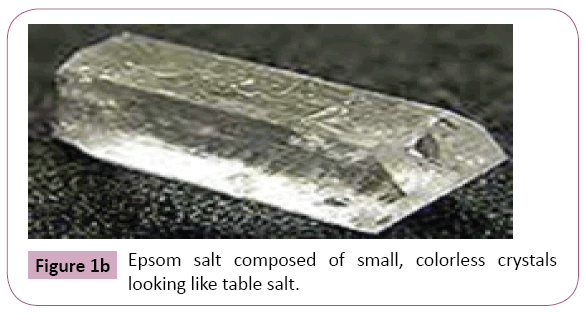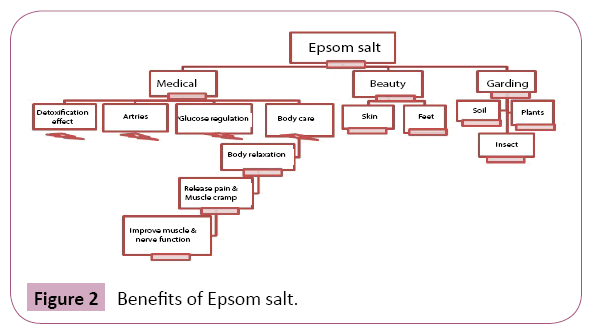ISSN : 2393-8862
American Journal of Pharmacology and Pharmacotherapeutics
Pharmaceutical Influences of Epsom Salts
Faculty of Science, Department of Chemistry, Biochemistry Division, Damietta University, Damietta, Box 34517, Egypt
- *Corresponding Author:
- Walaa Fikry Elbossaty
Faculty of Science, Department of Chemistry
Biochemistry Division, Damietta University
Damietta, Box 34517, Egypt.
Tel: 020573761683
E-mail: walaafikry1985@gmail.com
Received Date: June 27, 2018; Accepted Date: July 27, 2018; Published Date: July 31, 2018
Citation: Elbossaty WF (2018) Pharmaceutical Influences of Epsom Salts. Am J Pharmacol Pharmacother. Vol.5 No.1:2. DOI: 10.21767/2393-8862.100011
Abstract
Epsom salt is chemical salt with mixture of magnesium and sulfate ions. Epsom salt and table salt are different in their chemical structure. Epsom salt plays various pharmaceutical effects in medical field, where it affects various body organs. It plays an important role in release of pain due to its effect on nerve and its characters' as antiinflammatory and treatment of muscle cramps. Also, Epsom salt has beauty influence on body care due to its effect on skin and feet. Not only Epsom salt has grade effect on health of human being but also it has effect on plants growth through its effect on soil, and insect. In this short communication we summarize the biological effects of Epsom salt.
Keywords
Epsom salt; Mg ion; Sulfate ion; Nerve function; Muscle cramps
Introduction
Epsom salt is not true salt, but it is known as a salt due to its chemical structure. It consists of mixture of magnesium and sulfate (Figure 1a). It is composed of small, colorless crystals thus looks like table salt (Figure 1b) The "Epsom" portion is a place in England where it is naturally found [1].
Mechanism of action
Several studies indicated that, in water Epsom salt dissociated in to magnesium ions, and sulfate ions. These ions are easy to absorb through the skin, this improve the benefit of Epsom salt [2].
Magnesium plays bio vital roles in the body including regulating the activity of many enzymes, reducing inflammation, relaxation of muscle and helps to prevent artery hardening. In addition, sulfates helps in improving the absorption of nutrients, removing toxins from the body, and treatment of headaches [3].
Benefits of Epsom salt
There are numerous benefits of Epsom salt, which can be summarize in the following diagram (Figure 2) [4].
A. Medical benefits
1. Body relaxation
During stress the level of magnesium ion decreases, on the other hand level of stress hormone (adrenaline) increases. Once Epsom salt dissolves in warm water, magnesium ions breaks apart from Epsom salt molecules, and then it is absorbed through the skin and level of magnesium in the body gets elevated. The magnesium helps by decreasing stress through promoting the production of serotonin, which is responsible for feel of calm and relaxation, and reduces the effect of adrenaline [5]. Magnesium also plays a critical role in the production of energy in cells (ATP) and helps in feeling restlessness or anxiety [6].
2. Releases pain and muscle cramps
An Epsom salt characterized with its anti-inflammatory effect, making it beneficial in the treatment of bronchial asthma, sore muscles, and migraine headaches. Magnesium appears to inhibit nerve receptors linked to the trigger point pain and regulate the release of neurohormones [7].
3. Improvement of muscles and nerves function
Several researches show that magnesium ions in Epsom salt can help regulate electrolytes in the body, through its effect on many enzymes that are responsible for regulating fluid retention in cells, and facilitates the body’s use of calcium to transmit chemical signals throughout the nervous system. When cellular magnesium increases, inflammatory processes such as the release of pro-inflammatory proteins decrease. Magnesium may also prevent the activation of receptors found in nerve cells that regulate pain [8].
4. Prevention of arteries hardness and blood clots
Epsom salt improves the blood circulation, hence help in prevention of heart disease, strokes, elasticity of arteries, preventing blood clots, and lowering of blood pressure. Magnesium ions are responsible for treatment of blood clotting where the ratio of calcium to magnesium is important because while calcium is responsible for the formation of blood clots, magnesium is responsible for their termination [9].
5. Blood glucose regulation
Both magnesium, and sulfate ions regulate the glucose intake, secretion of insulin, so prevent development of diabetes. Magnesium deficiency could impair blood sugar control by reducing sugar uptake (insulin sensitivity), impairing insulin release and/or increasing oxidative stress [10].
6. Detoxification effects
The sulfates ions in Epsom salt helps in removing both toxins and heavy metals from the cells. Epsom salt can be used as saline laxative so, it removes the harmful bacterial in intestine and is used in treatment of constipation. Magnesium supports detoxifications systems in the body through its major role in the production of energy (as ATP), which provides cells with the energy they require for pumping out toxins before, during, and after they accumulate [11].
High levels of energy are needed for the function of sodium/ potassium ATPase the enzyme that uses this energy to pump sodium ions from cells and potassium ions into cells. Cells use ATPase as the pumping mechanism for transporting nutrients, preserving proper concentrations of minerals within cells (and extracellular fluid), and removing toxins [12].
B. Beauty uses of Epsom salt
Epsom salt is use to remove dead skin and oil from your pores helping skin to look healthier and feel softer. Use this treatment on hands, feet, and everything in between, remove foot odor. Magnesium helps improve your skin's overall appearance, reducing acne and other skin disorders by lowering cortisol levels, stabilizing hormonal imbalances, and improving cellular processes [13].
C. Gardening benefits of Epsom salts
Most plants need nutrients like magnesium and sulfur to stay in good health, and Epsom salt makes the primary nutrients in most plant foods (nitrogen, phosphorus, potassium) [14].
Magnesium sulfate crystals, when added to the soil, provide vital nutrients that helps in preventing yellowing leaves and the loss of green color (magnesium is an essential element in the chlorophyll molecule) in plants. As well as it removes unwanted insect pests, and prevent slugs among other things. Epsom salt is regularly recommended for tomatoes to prevent blossom end rot [15].
References
- Büchel KH, Moretto HH, Werner D (2000) Industrial inorganic chemistry (2nd edn), John Wiley & Sons, NY, USA.
- The American Society of Health-System Pharmacists (2017) Magnesium sulfate. Archived from the original on 21 May, 2016. Retrieved on 8 January, 2017.
- Romani A (2013) Magnesium in health and disease. In: Interrelations between essential metal ions and human diseases, USA.
- De Baaij J, Hoenderop J, Bindels R (2015) Magnesium in man: implications for health and disease. Physiol Rev 95: 1-46.
- Katri P, Nora S, Riitta K (2012) Dietary factors and fluctuating levels of melatonin. Food Nutr Res 56: 17252.
- Uwe G, Joachim S, Klaus K (2015) Magnesium in prevention and therapy. Nutrients 7: 8199-8226.
- Albert F, Lea S, Nathan B (2015) Myofascial trigger point-focused head and neck massage for recurrent tension-type headache: A randomized, placebo-controlled clinical trial. Clin J Pain 31: 159-168.
- Hossam A, Mohamed I, Hossam E (2014) Magnesium sulfate in femoral nerve block, does postoperative analgesia differ? A comparative study. Egypt J Anaesth 30: 169-173.
- Lilia Y (2017) Platelets are responsible for the accumulation of ß-amyloid in blood clots inside and around blood vessels in mouse brain after thrombosis. Brain Res Bull 128: 98-105.
- Mario B, Ligia J (2015) Magnesium and type 2 diabetes. World J Diabetes 6: 1152-1157.
- Wilhelm J, Markus K (2012) Magnesium basics. Clin Kidney J 5: i3–i14.
- Clausen M, Hilbers F, Poulsen H (2017) The structure and function of the Na, K-ATPase Isoforms in health and disease. Front Physiol 8.
- WHO Model List of Essential Medicines (2015) World Health Organization. April 2015. Archived from the original on 13 May, 2015. Retrieved on 14 December, 2015.
- Merhaut D (2006) Magnesium. In: Handbook of plant nutrition. Barker AV, Pilbeam DJ (eds) CRC Press, Boca Raton, UK p: 154.
- Pubchem (2016) Magnesium sulfate. from the original on 18 October, 2016.
Open Access Journals
- Aquaculture & Veterinary Science
- Chemistry & Chemical Sciences
- Clinical Sciences
- Engineering
- General Science
- Genetics & Molecular Biology
- Health Care & Nursing
- Immunology & Microbiology
- Materials Science
- Mathematics & Physics
- Medical Sciences
- Neurology & Psychiatry
- Oncology & Cancer Science
- Pharmaceutical Sciences



